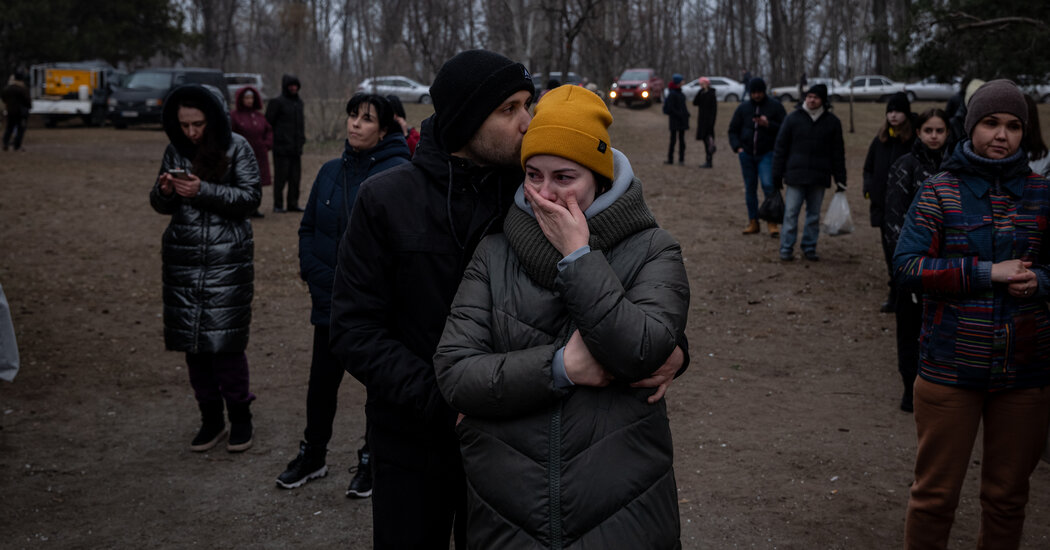
In pledging to send a squadron of tanks to Ukraine, Britain is leading a push for Western allies to accelerate the delivery of modern weapons for Kyiv’s war effort as fears rise that Russia will soon begin a new offensive.
This week, Britain’s foreign secretary, James Cleverly, will visit the United States and Canada to discuss how the three nations can coordinate even more closely on sanctions against Russia and military aid for Kyiv. The defense secretary, Ben Wallace, will head to Estonia and Germany to meet with NATO members and other allies.
The meetings come on the heels of Britain’s announcement on Saturday that it would send a squadron of 14 Challenger 2 tanks to Ukraine. Only months ago, such aid was considered taboo, for fear that it would prompt Russia to escalate the war. But as Ukraine has persisted with its demands for weapons and made advances on the battlefield, its allies have fulfilled more and more of its requests.
“They have finally accepted that this going to be a long war unless they intervene with even more resources to speed up a Ukrainian victory,” said Mick Ryan, a military strategist and retired Australian army major general who is a fellow at the Lowy Institute, a research institute.
NATO’s secretary general, Jens Stoltenberg, said that after Britain’s commitment for heavy hardware, “I expect more in the near future,” according to an interview with the German newspaper Handelsblatt published on Sunday.
Britain’s prime minister, Rishi Sunak, said that the aid was needed urgently to enable Ukraine to take advantage of Russia being on the back foot on the battlefield because of supply issues and plummeting morale. Mr. Sunak has also sought to use the announcement to burnish Britain’s credentials as a leading supporter of Ukraine’s war effort.
“As the people of Ukraine approach their second year living under relentless Russian bombardment, the prime minister is dedicated to ensuring Ukraine wins this war,” a Downing Street spokesperson said in a statement on Saturday, adding that Mr. Sunak believed “that a long and static war only serves Russia’s ends.”
Mr. Sunak said Ukraine’s allies should deliver all the aid, both diplomatic and military, that they have planned to give Ukraine this year as soon as possible. Britain has said that in 2023 it plans to match or exceed the assistance that it provided Ukraine last year.
Concerns about a new Russian offensive have been growing, and one Western analyst and former NATO official, Camille Grand, said that Moscow appeared to be mobilizing hundreds of thousands of new conscripts, which he said had accelerated the discussion around providing Ukraine with tanks.
Kyiv has pleaded for Western tanks almost since the start of the war to supplement the Soviet-era and Russian-made tanks that were in Ukraine’s stockpiles or supplied by other countries in Eastern Europe. Those tanks are wearing out fast after months of battle.
Britain’s announcement was expected to ratchet up pressure on Germany to commit to sending its coveted Leopard 2 tanks to Ukraine, or to at least allow other European countries that have those German-made tanks to give them to Ukraine. Poland’s government said last week that it wanted to give Ukraine some of its German-made tanks, although Berlin would need to allow it.
Mr. Sunak’s office said that the tanks would go into the country within weeks, and that more shipments of guns and ammunition were expected to follow.
Britain will begin training Ukrainian forces on the tanks and guns in coming days, the prime minister’s office said. Thousands of Ukrainian troops trained in Britain over the last six months. Mr. Wallace, the defense secretary, is scheduled to provide further details of Britain’s support for Ukraine in the House of Commons on Monday.
Russia has played down the importance of the new equipment. The Kremlin’s spokesman, Dmitri S. Peskov, said on Monday that Western armored vehicles “can’t change anything” on the battlefield. “These tanks burn well and will continue to burn,” he said, according to the state-run Tass news agency.
Lara Jakes, Isabella Kwai, Stephen Castle and Ben Hubbard contributed reporting.




